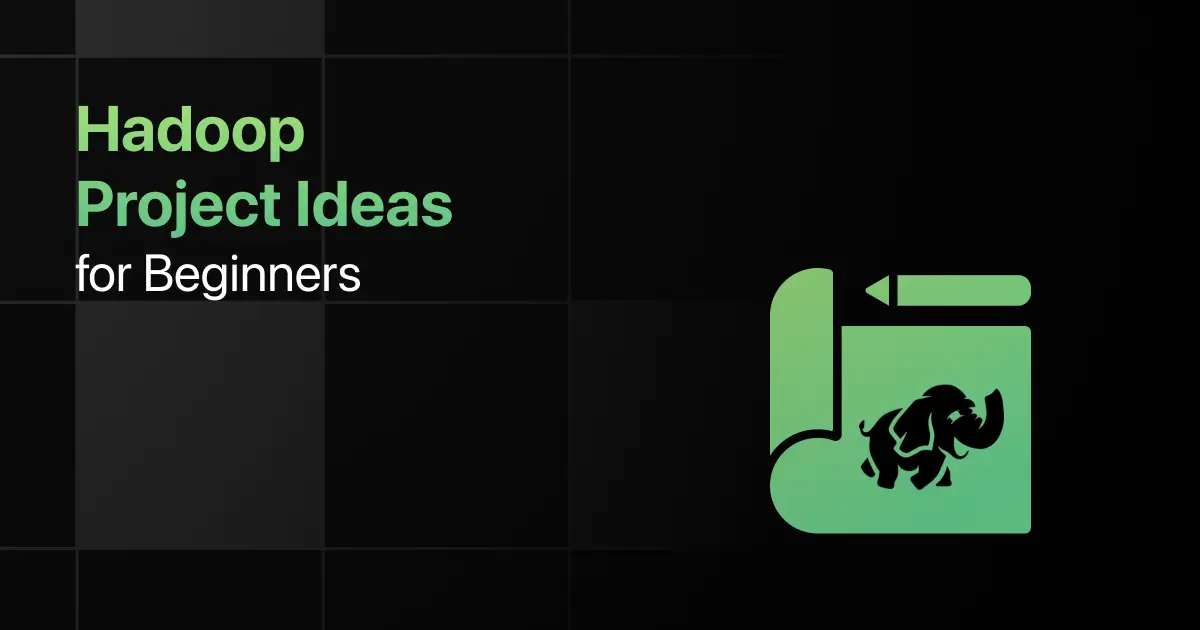Best Hadoop Project Ideas for Beginners

Getting started with Hadoop can be both exciting and overwhelming, but beginner-friendly projects offer a practical path to mastering big data concepts.
These simple Hadoop project ideas help lay a strong foundation in data processing and distributed computing.
10 Beginner-Friendly Hadoop Project Ideas – Overview
Here’s an overview of the 10 best Hadoop Project Ideas for beginners:
| S.No. | Project Title | Complexity | Estimated Time | Source Code |
|---|---|---|---|---|
| 1 | Word Count using MapReduce | Easy | 2 hours | Get Started |
| 2 | Analyzing Website Log Files | Easy | 3 hours | Get Started |
| 3 | Movie Rating Analysis with Hadoop | Easy | 3 hours | Get Started |
| 4 | Hadoop-Based Weather Data | Easy | 3 hours | Get Started |
| 5 | Retail Transaction Data Analysis | Easy | 5 hours | Get Started |
| 6 | Twitter Hashtag Count with Hadoop | Medium | 6 hours | Get Started |
| 7 | Hadoop-Based Airline Delay Analysis | Medium | 7 hours | Get Started |
| 8 | Hadoop for Crime Data Pattern Detection | Hard | 9 hours | Get Started |
| 9 | Hadoop-Based E-commerce Product Recommendation | Hard | 10 hours | Get Started |
| 10 | Hadoop-Based Sentiment Analysis on Reviews | Hard | 12 hours | Get Started |
Top 10 Hadoop Project Ideas for Beginners
Here are the top 10 hadoop project ideas for beginners
1. Word Count using MapReduce
This is one of those hadoop based projects is about using the Hadoop MapReduce framework to count the frequency of words in a given text dataset.
You will learn how serverless computing distributes data processing tasks across nodes to achieve efficient parallelism.
Duration: 2 hours
Project Complexity: Easy
Key Concepts Covered:
- Hadoop MapReduce
- Text file processing
- Key-value pair logic
Implementation Steps:
- Set up the Hadoop environment and input sample text data.
- Write a Mapper function to tokenize and emit word counts.
- Create a Reducer to aggregate word counts.
- Package the code and run it using the Hadoop CLI.
- View output results stored in HDFS.
Required Pre-requisites:
- Basic Java or Python knowledge
- Familiarity with Hadoop command-line
- Understanding of distributed computing basics
Resources Required:
- Hadoop installed (local or pseudo-distributed mode)
- Sample .txt dataset
- Java/Python IDE
Real-World Application:
- Log file analysis in large systems
- Pre-processing step for text-based machine learning models
2. Analyzing Website Log Files
This is one of those Hadoop mini projects that involves processing and analyzing large-scale web server log files using Hadoop to extract meaningful metrics like traffic volume and user behavior.
You will learn how serverless computing frameworks like Hadoop handle log parsing and aggregation tasks across distributed nodes.
Duration: 3 hours
Project Complexity: Easy
Key Concepts Covered:
- Log file parsing
- MapReduce processing
- Pattern recognition
Implementation Steps:
- Collect or simulate Apache/Nginx log files.
- Write a Mapper to extract IP addresses, timestamps, and URLs.
- Create a Reducer to count hits per page or user.
- Run the job on Hadoop and verify the output in HDFS.
- Interpret results to generate user traffic insights.
Required Pre-requisites:
- Basic knowledge of web server logs
- Understanding of Hadoop MapReduce
- Familiarity with regular expressions
Resources Required:
- Hadoop setup
- Sample access logs (.log files)
- Text editor or IDE
Real-World Application:
- Web analytics for traffic and performance monitoring
- Detecting unusual access patterns or potential security breaches
3. Movie Rating Analysis with Hadoop
This is one of the simple Hadoop project ideas that involves processing and analyzing large-scale web server log files using Hadoop to extract meaningful metrics like traffic volume and user behavior.
You will learn how serverless computing frameworks like Hadoop handle log parsing and aggregation tasks across distributed nodes.
Duration: 3 hours
Project Complexity: Easy
Key Concepts Covered:
- Log file parsing
- MapReduce processing
- Pattern recognition
Implementation Steps:
- Collect or simulate Apache/Nginx log files.
- Write a Mapper to extract IP addresses, timestamps, and URLs.
- Create a Reducer to count hits per page or user.
- Run the job on Hadoop and verify the output in HDFS.
- Interpret results to generate user traffic insights.
Required Pre-requisites:
- Basic knowledge of web server logs
- Understanding of Hadoop MapReduce
- Familiarity with regular expressions
Resources Required:
- Hadoop setup
- Sample access logs (.log files)
- Text editor or IDE
Real-World Application:
- Web analytics for traffic and performance monitoring
- Detecting unusual access patterns or potential security breaches
4. Hadoop-Based Weather Data
This project focuses on analyzing large volumes of historical weather data using Hadoop to determine temperature trends and extreme weather events.
You will learn how serverless computing facilitates scalable processing of time-series datasets across distributed systems.
Duration: 3hours
Project Complexity: Easy
Key Concepts Covered:
- Time-series data processing
- Hadoop MapReduce
- Weather data parsing
Implementation Steps:
- Obtain a sample dataset of historical weather records (e.g., NOAA).
- Implement a Mapper to extract date, location, and temperature values.
- Write a Reducer to find max/min/avg temperatures by date or location.
- Execute the job on Hadoop and store output in HDFS.
- Review the results to identify patterns and anomalies.
Required Pre-requisites:
- Understanding of CSV or fixed-width data formats
- Basic Hadoop commands
- Some knowledge of data aggregation
Resources Required:
- Hadoop environment
- Weather dataset (.csv or text-based)
- Code editor (Java or Python support)
Real-World Application:
- Analyzing climate trends for research or agriculture
- Building a backend for weather reporting tools
5. Retail Transaction Data Analysis
This project is about analyzing large-scale retail transaction data using Hadoop to uncover purchasing patterns and sales performance.
You will learn how serverless computing enables scalable batch processing of structured business data for actionable insights.
Duration: 5 hours
Project Complexity: Easy
Key Concepts Covered:
- Data grouping and aggregation
- Hadoop MapReduce operations
- Transactional data handling
Implementation Steps:
- Collect or use sample retail transaction datasets (e.g., sales.csv).
- Implement a Mapper to extract product IDs, quantities, and sales amounts.
- Use a Reducer to calculate total sales per product or category.
- Run the MapReduce job in a Hadoop environment.
- Review results to identify best-selling items or peak shopping times.
Required Pre-requisites:
- Basic knowledge of CSV data structure
- Understanding of Hadoop, HDFS, and MapReduce
- Familiarity with basic data aggregation logic
Resources Required:
- Hadoop setup
- Sample retail transaction dataset
- Java or Python coding environment
Real-World Application:
- Inventory management and dynamic pricing strategies
- Data-driven marketing and sales forecasting
6. Twitter Hashtag Count with Hadoop
This project focuses on processing large Twitter datasets using Hadoop to count and rank the most frequently used hashtags.
You will learn how serverless computing handles unstructured social media data and performs scalable keyword frequency analysis.
Duration: 6 hours
Project Complexity: Medium
Key Concepts Covered:
- Text parsing in MapReduce
- Social media data processing
- Hashtag frequency counting
Implementation Steps:
- Collect or simulate a dataset of tweets in JSON or CSV format.
- Write a Mapper to extract hashtags from tweet text.
- Implement a Reducer to tally hashtag occurrences.
- Run the MapReduce job on Hadoop and save output in HDFS.
- Analyze the top trending hashtags based on count.
Required Pre-requisites:
- Understanding of JSON or CSV tweet formats
- Familiarity with string parsing and tokenization
- Basic Hadoop and MapReduce knowledge
Resources Required:
- Hadoop environment
- Twitter dataset (real or sample)
- Code editor with Java/Python support
Real-World Application:
- Tracking brand engagement and marketing trends
- Monitoring viral content and real-time public sentiment
7. Hadoop-Based Airline Delay Analysis
This project analyzes historical airline data to identify delay patterns and their causes using Hadoop’s distributed processing.
You will learn how serverless computing frameworks manage large tabular datasets for performance metrics and statistical insights.
Duration: 7 hours
Project Complexity: Medium
Key Concepts Covered:
- Tabular data analysis
- Delay pattern recognition
- MapReduce aggregation
Implementation Steps:
- Download a public airline delay dataset (e.g., from the US DOT).
- Build a Mapper to extract flight date, delay time, and reason codes.
- Create a Reducer to group and calculate average delays by airline or route.
- Execute the MapReduce job on a Hadoop cluster.
- Analyze results for performance and bottleneck identification.
Required Pre-requisites:
- Basic knowledge of flight data structure
- Experience with Hadoop MapReduce
- Understanding of data filtering and grouping
Resources Required:
- Hadoop system (local or cloud)
- Airline on-time performance dataset
- Java or Python development tools
Real-World Application:
- Improving airline scheduling and customer service
- Identifying systemic delays for regulatory and operational improvements
8. Hadoop for Crime Data Pattern Detection
This project uses Hadoop’s distributed processing capabilities to detect crime patterns from historical crime data.
You will learn how serverless computing enables efficient parsing and aggregation of large public safety datasets to support data-driven decision-making.
Duration: 9 hours
Project Complexity: Hard
Key Concepts Covered:
- Geo-temporal data grouping
- Pattern recognition via MapReduce
- Large-scale crime data analysis
Implementation Steps:
- Obtain an open-source crime dataset (e.g., city crime logs).
- Write a Mapper to extract location, time, and crime type.
- Build a Reducer to aggregate occurrences by region or time slot.
- Run the MapReduce program across the dataset in Hadoop.
- Interpret the output to detect crime hotspots and frequency patterns.
Required Pre-requisites:
- Understanding of CSV/JSON crime datasets
- Knowledge of Hadoop MapReduce
- Basic statistics or data analysis skills
Resources Required:
- Hadoop ecosystem setup
- Public crime dataset (CSV/JSON)
- A code editor with Java or Python
Real-World Application:
- Assisting law enforcement in predictive policing
- Optimizing public safety resource allocation based on crime trends
9. Hadoop-Based E-commerce Product Recommendation
This project is about building a recommendation engine using Hadoop to analyze user behavior and purchase history in an e-commerce dataset.
You will learn how serverless computing handles large-scale user-item data to generate personalized product suggestions efficiently.
Duration: 10 hours
Project Complexity: Hard
Key Concepts Covered:
- Collaborative filtering
- User-product relationship analysis
- Scalable recommendation logic
Implementation Steps:
- Ingest a sample e-commerce dataset with user activity logs.
- Develop a Mapper to extract user-item interactions.
- Use a Reducer to calculate co-occurrence or similarity scores.
- Rank items based on relevance to individual users.
- Output recommendations per user using MapReduce jobs.
Required Pre-requisites:
- Basics of recommendation systems
- Proficiency with MapReduce logic
- Comfort with structured datasets
Resources Required:
- Hadoop setup (local/cluster)
- E-commerce user behavior dataset
- Java/Python with Hadoop integration
Real-World Application:
- Powering real-time product suggestions on e-commerce platforms
- Enhancing user engagement through personalized shopping experiences
10. Hadoop-Based Sentiment Analysis on Reviews
This project focuses on performing sentiment analysis on large-scale product or service reviews using Hadoop and MapReduce.
You will learn how serverless computing enables efficient processing of unstructured textual data to derive insights at scale.
Duration: 12 hours
Project Complexity: Hard
Key Concepts Covered:
- Text preprocessing with Hadoop
- Sentiment classification
- Word frequency analysis
Implementation Steps:
- Collect and store a dataset of user reviews in HDFS.
- Use a Mapper to tokenize and clean the text data.
- Implement a Reducer to classify and count sentiment tags (positive/negative/neutral).
- Aggregate and visualize sentiment trends over time.
- Optimize MapReduce logic for better runtime.
Required Pre-requisites:
- Basic NLP concepts
- Familiarity with MapReduce
- Understanding of text-based data structures
Resources Required:
- Hadoop ecosystem (preferably with HDFS)
- Labeled review dataset (Amazon, Yelp, etc.)
- Java or Python with suitable sentiment libraries
Real-World Application:
- Gauging customer feedback for product improvement
- Driving marketing strategies based on consumer emotions
Final Words
Exploring beginner-level Hadoop projects is a great way to build confidence and gain practical experience in big data technologies.
With each project, you take a step closer to mastering real-world data challenges using Hadoop.
Explore More Project Ideas
- Python
- Java
- C Programming
- HTML and CSS
- React
- JavaScript
- PHP
- C++
- DBMS
- SQL
- Excel
- Angular
- Node JS
- DSA
- Django
- Power BI
- R Programming
- Operating System
- MongoDB
- React Native
- Golang
- Matlab
- Tableau
- .Net
- Bootstrap
- C#
- Next JS
- Kotlin
- jQuery
- React Redux
- Rust
- Shell Scripting
- Vue JS
- TypeScript
- Swift
- Perl
- Scala
- Figma
- RPA
- UI/UX
- Automation Testing
- Blockchain
- Cloud Computing
- DevOps
- Selenium
- Internet of Things
- Web Development
- Data Science
- Android
- Data Analytics
- Front-End
- Back End
- MERN Stack
- Big Data
- Data Engineering
- Full Stack
- MEAN Stack
- Artificial Intelligence
- Machine Learning
- Arduino
- Cyber Security
- Raspberry Pi
- Spring Boot
- NLP
- Embedded Systems
- Computer Network
- Game Development
- Flask
- Data Visualization
- Ethical Hacking
- Computer Vision
- AWS
- Data Mining
- Azure
- Network Security
- Microservices
- Augmented Reality
- Bioinformatics
- Virtual Reality
- Text Mining
- Unity
- Kubernetes
- Unreal Engine
- Terraform
- Linux
- Chatbot
- Deep Learning
- API
- Cloud Security
- Home Automation
- Quantum Computing
- FinTech
- Sentiment Analysis
- Recommendation System
- Robotics
- NodeMCU
- Large Language Models
- Penetration Testing
- Google Cloud Platform
- Edge Computing
- Pattern Recognition
- ElasticSearch
- MLflow
- Voice Recognition
- Data Recognition
- Keras
- WordPress
FAQs
Easy Hadoop project ideas include Word Count using MapReduce, Analyzing Website Log Files, Hadoop-Based Weather Data, Twitter Hashtag Count, and Retail Transaction Data Analysis.
Hadoop project ideas help beginners apply theoretical knowledge in real-world data scenarios and build hands-on skills in big data processing.
Beginners can learn data ingestion, MapReduce logic, HDFS operations, basic data analysis, and scalable data handling techniques.
The Word Count using MapReduce project is highly recommended due to its simplicity and clarity in understanding the Hadoop workflow.
A beginner-level Hadoop project typically takes around 6 to 8 hours to complete, depending on the project’s complexity and familiarity with the tools.
Related Posts


How to Prepare for .Net Interview
Are you preparing for a .NET interview but not sure which topics to prioritize? Many candidates struggle to balance C# fundamentals, …
Warning: Undefined variable $post_id in /var/www/wordpress/wp-content/themes/placementpreparation/template-parts/popup-zenlite.php on line 1050








